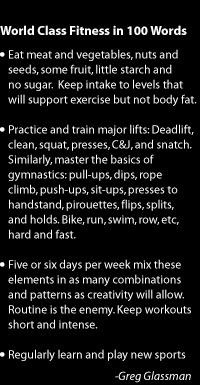January's Challenge is the 8 Week Nutrition Challenge.
1-do research on proper nutrition
2-make a commitment and set goals
3-document your eating habits, how you feel in the gym and body composition results
This challenge is a little different in that the goal is to be informed and aware of what you are putting in your body. You can follow any "diet" you would like just stick to it. We have links and write ups below and on the right column of our website for you to read. If you need more information, let us know. If you would like to weigh, measure and record everything you eat, good for you, personally I'm not carrying around a little scale.
You can write down your goals, what you have been eating and the results. We may ask for a some feedback to share. It is up for you to decide if you won the challenge or not. Good luck.
___________________________________________
Here is a brief write up we previously posted.
Protein should be lean and varied and account for about 30% of your total caloric load.
Carbohydrates should be predominantly low-glycemic and account for about 40% of your total caloric load.
Fat should be predominantly monounsaturated and account for about 30% of your total caloric load.
Calories should be set at between .7 and 1.0 grams of protein per pound of lean body mass depending on your activity level. The .7 figure is for moderate daily workout loads and the 1.0 figure is for the hardcore athlete.
What Should I Eat?
In plain language, base your diet on garden vegetables, especially greens, lean meats, nuts and seeds, little starch, and no sugar. That's about as simple as we can get. Many have observed that keeping your grocery cart to the perimeter of the grocery store while avoiding the aisles is a great way to protect your health. Food is perishable. The stuff with long shelf life is all suspect. If you follow these simple guidelines you will benefit from nearly all that can be achieved through nutrition.
The Caveman or Paleolithic Model for Nutrition
Modern diets are ill suited for our genetic composition. Evolution has not kept pace with advances in agriculture and food processing resulting in a plague of health problems for modern man. Coronary heart disease, diabetes, cancer, osteoporosis, obesity and psychological dysfunction have all been scientifically linked to a diet too high in refined or processed carbohydrate. Search "Google" for Paleolithic nutrition, or diet. The return is extensive, compelling, and fascinating. The Caveman model is perfectly consistent with the CrossFit prescription.
What Foods Should I Avoid?
Excessive consumption of high-glycemic carbohydrates is the primary culprit in nutritionally caused health problems. High glycemic carbohydrates are those that raise blood sugar too rapidly. They include rice, bread, candy, potato, sweets, sodas, and most processed carbohydrates. Processing can include bleaching, baking, grinding, and refining. Processing of carbohydrates greatly increases their glycemic index, a measure of their propensity to elevate blood sugar.
What is the Problem with High-Glycemic Carbohydrates?
The problem with high-glycemic carbohydrates is that they give an inordinate insulin response. Insulin is an essential hormone for life, yet acute, chronic elevation of insulin leads to hyperinsulinism, which has been positively linked to obesity, elevated cholesterol levels, blood pressure, mood dysfunction and a Pandora's box of disease and disability. Research "hyperinsulinism" on the Internet. There's a gold mine of information pertinent to your health available there. The CrossFit prescription is a low-glycemic diet and consequently severely blunts the insulin response.
Caloric Restriction and Longevity
Current research strongly supports the link between caloric restriction and an increased life expectancy. The incidence of cancers and heart disease sharply decline with a diet that is carefully limited in controlling caloric intake. “Caloric Restriction” is another fruitful area for Internet search. The CrossFit prescription is consistent with this research.
The CrossFit prescription allows a reduced caloric intake and yet still provides ample nutrition for rigorous activity.
2010-01-01
Subscribe to:
Post Comments (Atom)





















0 comments:
Post a Comment